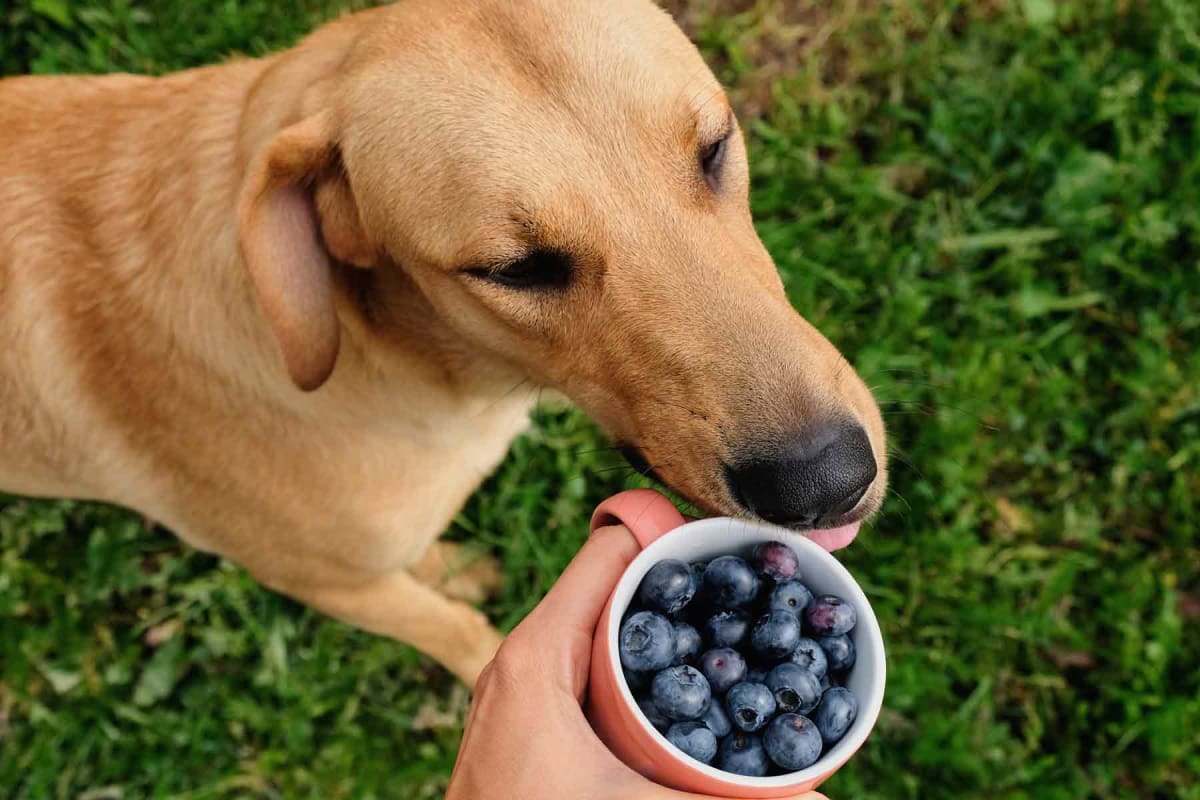
Can dogs eat blueberries?
Can dogs eat blueberries?
Can dogs eat blueberries?
Yes, dogs can eat blueberries! These tiny blue fruits are safe for your canine companion and can be a healthy addition to their diet. Blueberries are low in calories but packed with nutrients that can benefit your dog's health. Let's explore this topic thoroughly to ensure your pup stays happy and healthy.
Can puppies eat blueberries?
Yes, puppies can enjoy blueberries too! They offer the same health benefits as they do for adult dogs. Just be sure to cut them into smaller pieces to prevent choking, and adjust the amount based on your puppy's smaller size. Introduce them slowly and in very small quantities (start with just one blueberry).
Are blueberries good for dogs?
Not only are blueberries safe for dogs, but they're also beneficial for your pup's health. These little berries pack a powerful nutritional punch that can support your dog's wellbeing in multiple ways:
Rich in antioxidants: Protect cells from damage and may offer anti-inflammatory benefits
High in fiber: Supports digestions and promotes gut health
Low in calories: Perfect for treats that won't contribute to weight gain
Contain vitamins C and K: Support immune function and bone health
Provide manganese: Important for bone development and metabolism
When are blueberries bad for dogs?
While blueberries are generally safe for dogs, there are a few situations when they might not be the best choice for your precious pup.
Due to the high fiber content, too many blueberries at once can cause digestive upset, including diarrhea or stomach discomfort.
For dogs with certain health conditions, like diabetes, food allergies, or conditions with specific medication regimens, blueberries should be avoided.
Always consult with your veterinarian before introducing any new food into your dog's diet, especially if they have existing health concerns or dietary restrictions.
How to serve blueberries to your dog
Fresh, washed blueberries are the best option for your dog. Always thoroughly rinse them to remove any pesticides or contaminants before serving. For small dogs or puppies, you may want to cut blueberries in half to prevent choking.
Some serving suggestions:
Plain and fresh after washing
Frozen blueberries for a refreshing summer treat
Mashed and mixed into regular food for a nutrient boost
Used in homemade dog treats for special occasions
Avoid blueberries prepared with added sugars, chocolate, artificial sweeteners (especially xylitol, which is toxic to dogs), or other ingredients that could be harmful to your pet.
How many blueberries can dogs eat?
Moderation is key when feeding any treat to your dog, including blueberries. Treats—even healthy ones—should only make up about 10% of your dog's total daily caloric intake. The appropriate serving size depends on your dog's weight and overall health condition.
As a general guideline for fresh blueberries, a small dog should only have a few berries, while a larger dog can have a small handful.
Can dogs eat dried blueberries?
Yes, dogs can eat dried blueberries in moderation. However, dried blueberries often contain added sugars and preservatives which aren't great for your dog's health. Some dried blueberries may contain artificial sweeteners, including those that can be toxic to dogs. Fresh or frozen blueberries are a better option.
If you do feed dried blueberries to your pup, make sure they are plain and unsweetened. Consider dehydrating fresh blueberries at home to ensure they're free from harmful additives.

Introducing blueberries to your dog's diet
When adding any new food to your dog's diet, including blueberries, it's important to do so gradually and mindfully. Follow these guidelines, to keep your pup healthy when introducing blueberries:
Talk to your vet before making any changes to your dog's diet.
Then, start by offering just one or two blueberries and observe your dog for 24 to 48 hours.
Watch for any signs of digestive upset, allergic reactions, or behavioral changes.
If all goes well, you can slowly increase to the appropriate serving size for your dog's weight.
What to watch out for
Signs that may indicate your dog isn't tolerating blueberries well include:
Vomiting or diarrhea
Excessive licking, scratching, or skin issues
Lethargy or behavior changes
Loss of appetite
If you notice any of these symptoms, discontinue feeding blueberries and consult with your veterinarian. While rare, allergic reactions to any food are possible.
Other safe fruit options
Blueberries are a safe and healthy treat option, there are several other fruits that dogs can eat in moderation. The table below offers lists some safe fruits for dogs and also highlights some fruits that dogs should never eat.
| Safe fruits | Toxic fruits |
|---|---|
|
|